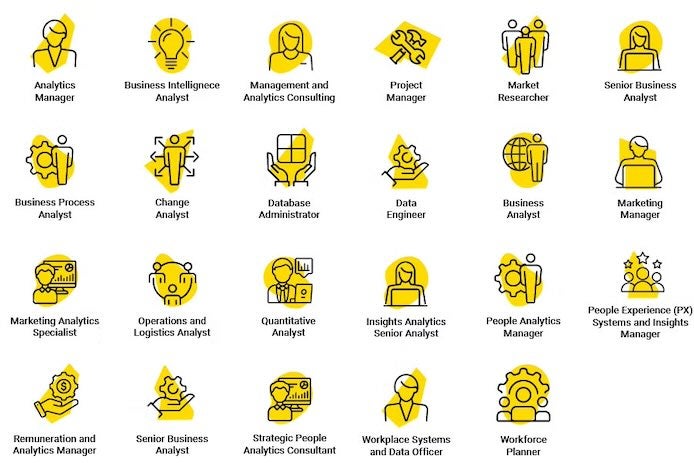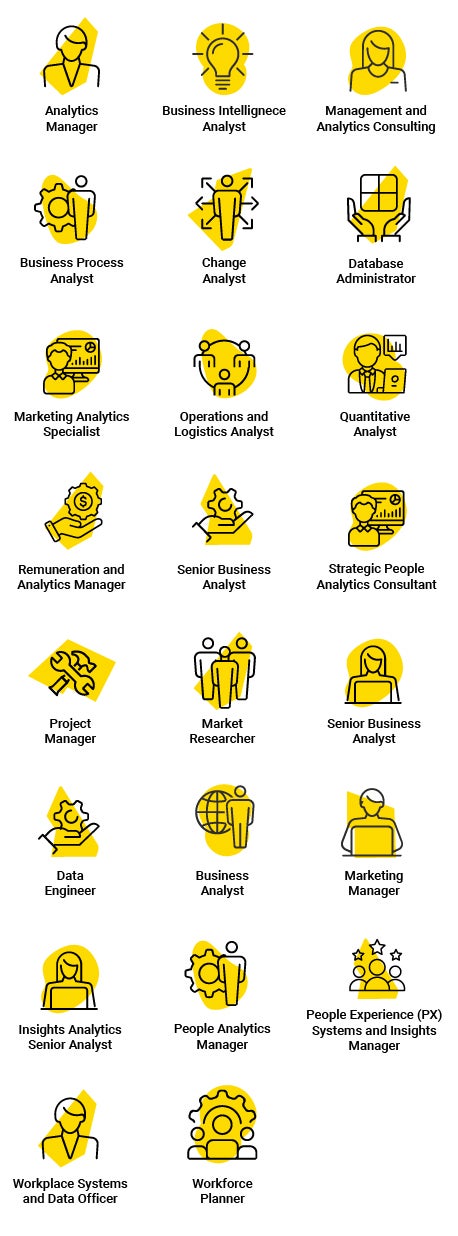Please select a field which you have completed your bachelor.
As little as 2 years
12 courses
January, March, May, July, September, October
100% Online
8437
Completion time dependent on individual study path, RPL, leave and course availability. Please speak to a Student Advisor for more information.
What you will study
The Master of Analytics program includes 12 online courses— 8 core courses and a choice of 4 specialisations in Human Resource Analytics or Marketing Analytics. Alternatively, you can opt for a general path, selecting electives that align with your career goals and interests.
You can also choose to study graduate certificates in Analytics, Marketing Analytics and Human Resource Analytics, or the Graduate Diploma in Analytics. The master’s program includes content from these certificates and diploma, plus additional electives and a capstone project.
To find out more about each course download the program guide.
“This was one of the most well-organised, clear and practical courses I have done. The way the program was structured, the explanations in the course material, and the examples were highly effective in helping me not only understand but enjoy what I was learning, as I could see myself improving. I very much appreciate the staff for their timely and detailed feedback both on assignments and on the forums.”
- Master of Analytics student
Career pathways
Whether you’re looking to advance your current role or upskill in an area of interest, the knowledge you gain from the online Master of Analytics at UNSW can have a positive effect on your career.
Download your program guide to find out more about how the Master of Analytics can help you in fast-tracking a rewarding and dynamic data analytics career.
Many career opportunities await Master of Analytics graduates.
You may pursue roles such as:
Introductory Data Analysis is a prerequisite for those interested in choosing:
- Predictive Analytics
- Data Visualisation & Communication
- Financial Modelling
- Decision Making for Analytics
- Managing Customer Analytics
- Foundations of Marketing Analytics
The UNSW Online experience
We are here to support you, every step of the way, to graduate from one of the world’s leading universities. Our online learning environment has been designed to seamlessly fit into your already busy schedule and you’ll be able to access course resources on any device, at any time.
Our academics are some of the best in the world and even though you’re studying online, you can expect your learning experience to be the same high standard as that of our on-campus students.
Throughout your study journey, you will be able to turn to your Student Success Advisor, who is committed to assisting you from enrolment through to graduation. They are on-hand for all non-academic queries by phone or email.
You will also have access to Career Success – a curated, self-paced module that provides a framework for thinking about and taking action to implement an effective career plan. Through Career Success, you will have access to tools like Career AI (powered by VMock) and CaseCoach, and guides on crafting the perfect LinkedIn profile, resume and cover letter.

All specialisations must complete the following 8 core courses:
- Introductory Data Analysis
- Analytics and Business
- Managing People, Analytics, and Change
- Data and Ethics
- Data Visualisation and Communication
- Predictive Analytics
- Database Management
- Principles of Programming
These courses have a pre-requisite: Introductory Data Analysis.
In addition to the core courses, choose 3 electives from the list below:
Electives (choose 3)
- Human Resources Analytics
- Analytics and Consulting
- Financial Modelling*
- Decision Making in Analytics*
- Foundations of Marketing Analytics*
- Social Media & Digital Analytics*
- Managing Customer Analytics*
*These courses have a pre-requisite: Introductory Data Analysis.
Entry requirements
In addition to the core courses, complete the following 4 specialisation core courses:
- Foundations of Marketing Analytics
- Social Media & Digital Analytics
- Managing Customer Analytics
- Marketing Analytics Capstone^
*These courses have a pre-requisite: Introductory Data Analysis.
^36 units of credit required.
General admission requirements
To be eligible for the Master of Analytics you must have:
- A recognised bachelor's degree (or equivalent qualification) with a credit average of 65% or higher as per the UNSW Admissions entry calculator.
In addition to the core courses, complete the following 2 specialisation core courses and choose 2 electives from the list below:
Specialisation Core Courses
- Human Resources Analytics*
- Human Resource Information Systems
Electives (choose 2)
- Managing Yourself and Others
- Career Navigator Strategic
- Consulting Project
- Human Resource Policies and Practices
- Employee Wellbeing and Engagement
- Sustainability and Human Resources
- Attracting, Evaluating and Retaining Talent
- Diversity, Equity and Inclusion
- Strategic Rewards and Performance Management
- Change Management
- Organisational Development
- Leadership Development
- Introductory Data Analysis
*These courses have a pre-requisite: Introductory Data Analysis.
Entry via nested qualification
Articulation pathways exist from the Graduate Certificate in Analytics, Graduate Certificate in Marketing Analytics, or Graduate Diploma in Analytics programs if the student completes these programs with a minimum WAM of 65.
- General Analytics Capstone
- Marketing Analytics Capstone
Related program
Prefer more statistics, machine learning and programming? Perhaps the Master of Data Science is for you.
If you're more interested in the financial applications of technology and programming, explore our Master of Financial Technology.

Skilled and qualified analytics experts are amongst the most highly sought-after professionals globally. This in-demand skill affects a wide range of industries. According to The 2021 Dresner study, adoption of big-data analytics was highest in telecommunications, insurance, and advertising, followed by financial services, healthcare, and technology.
Although the value of analytics is long recognised across industries, the digital transformation of the economy and the flood of data created daily has made it a crucial tool for organisations to influence strategic business decisions.
The online Master of Analytics at UNSW has been designed to ensure graduate can confidently apply highly technical and strategic influencing skills. The program prepares you for data analytics opportunities across a myriad of industries for existing and future roles. Job roles can include:
- Analytics Manager
- Business Analyst
- Business Intelligence Analyst
- Business Process Analyst
- Change Analyst
- Data Engineer
- Database Administrator
- Management and Analytics Consulting
- Market Researcher
- Marketing Analytics Specialist
- Marketing Manager
- Operations and Logistics Analyst
- Project Manager
- Quantitative Analyst
- Senior Business Analyst
The online Master of Analytics at UNSW is one of the most comprehensive postgraduate qualifications in data analytics, delivered online and accelerated so you can graduate in as little as two years without compromising your career.
Data has disrupted the skills and knowledge required of employees, across functions, to deliver value to their organisations. Organisations now demands professionals who can skilfully apply data-driven decisions and analytics capabilities to deliver a range of business solutions.
The online Master of Analytics at UNSW draws on thought leadership and advanced practice to produce a program that is comprehensive and contemporary. It teaches graduates the technical and analytical skills needed to source, analyse and apply data insights, and the strategic thinking and communication skills to drive business change.
This program is suitable for a range of business professionals, from data-driven decision makers in IT or Marketing to functional Business Analysts, Analytics Managers and future Chief Analytics & Insights Officers. It's for those who wish to upskill in data storytelling, data insights, consulting analytics and ethical analytics practice.
The online Master of Analytics at UNSW provides you with the skills employers demand, to fast-track you to a rewarding and dynamic career in Analytics. The program draws on thought leadership and advanced practice to ensure it is both comprehensive and contemporary. It delivers graduates the technical analytical skills needed to source, analyse, and apply data insights, and the strategic thinking and communication skills to use those insights to drive business change.
In contrast, the online Master of Data Science establishes students as an expert data scientist, with a focus on the comprehensive technical knowledge, so you can take advantage of the booming employment market and gain a professionally and financially rewarding data career.
If you are looking to upskill in analytics and do not have a recognised bachelor’s degree (or equivalent qualification), you can enter the Master of Analytics via an articulation pathway from the Graduate Certificate in Analytics. Upon successful completion of the Graduate Certificate with a minimum WAM of 65, students will be eligible to articulate to the Graduate Diploma of Analytics or the Master of Analytics with full credit for the courses completed as part of the Graduate Certificate.
Applicants for the Graduate Certificate in Analytics who do not have an undergraduate degree are required to have a minimum of 3 years relevant* or professional experience in analytics, clerical, or administrative work in a commercial, not-for-profit, or public service organisation or other analytics-related positions.
*Relevant experience includes being responsible for tasks that are non-routine, unstructured or semi-structured, engaging in problem-solving activities. It can include experience of managing a small team, being a team leader, managing a project or being responsible for the management and allocation of resources. Alternatively, engaging in a professional role over a period of time is relevant experience.
The total indicative cost of completing your degree depends on the elective courses you choose to complete and any recognition of prior learning before the commencement of your studies. For indicative domestic and international tuition fees visit the Fees page*.
FEE-HELP loans are available to assist eligible full-fee paying domestic students with the cost of a university program. This government loan scheme helps pay for all or part of their tuition. For more information visit: StudyAssist.
*All prices are listed in Australian dollars. Go to our Fees page for up-to-date information. Fees are subject to annual review by the University and may increase annually, with the new fees effective from the start of each calendar year. Indicative fees are a guide for comparison only based on current conditions and available data. You should not rely on indicative fees. Study plans and completion times might vary depending on the choice of elective courses, RPL, leave and course availability. For more information, please speak with a Student Advisor.
Study anywhere at any time, and graduate with a Master of Analytics in as little as two years without taking time out of the workforce. The immersive education experience has been crafted to align with the motivations and experiences of the busy working professional.
You can shape your studies to fit in with your career and lifestyle, studying one course at a time, increasing your employability, and instantly adding value to your career and organisation.
UNSW Online advises a minimum of 15-20 hours of study per week for the Master of Analytics. The study mode is 100% online so there are no on-campus requirements.
Discover tips on how to maximise your study.
Your previous studies can be acknowledged as credit towards your online postgraduate studies provided that they meet relevant course requirements. If you are eligible for admission and you have undertaken previous studies at another institution, you may be eligible to apply for Recognition of Prior Learning (RPL).
Students can apply for RPL during the program application process and must ensure all relevant supporting documents are submitted for assessment if requested by Admissions, including course outlines from the same year they completed the relevant course/s as content may change over time. Courses successfully completed within the past ten years can be used for credit transfer within a program as provided within the program rules and the University rules on credit.
If completed similar courses in previous undergraduate study, Master of Analytics students can claim up to 4 courses (24 units of credit) of RPL advanced standing. If students have completed postgraduate studies in addition to completed undergraduate studies, they can claim a maximum of 6 courses (36 units of credit) of RPL advanced standing for the Master of Analytics program.
Find out more about RPL and credit transfer at UNSW. Speak with a Student Enrolment Advisor to learn more about additional requirements and to receive guidance around the RPL process.












